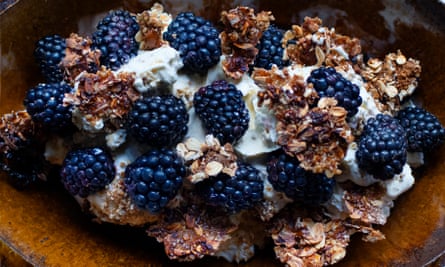
I am not yet ready for the slow blip-blip of a simmering casserole or the puttering of a steamed sponge pudding on the hob. Full-on winter cooking can just back off for a few weeks. Yet there is no denying the season is marching on a pace and I find myself needing spicy, smoky notes in my main dishes and a level of comfort-cooking in my desserts that no seasonal fruit alone can offer.
This wet autumn – will it ever stop raining? – has given me a fancy for oily fish, its skin toasted and smoky from time spent under a hot grill. I can rarely resist a shining mackerel on the fishmonger’s ice, but a more sustainable choice, and just as delicious, is herring. The best of this week’s fish dinners (there have been a couple) were those where our catch had been grilled with a mustard and harissa paste, the fish taking on a glossy golden sheen from the dressing in the heat.
Also on the table this week was a sweet-sharp salad of tomato and pomegranate dressed with sumac and fruit molasses. The sort of salad I would be happy to fold into couscous or perhaps a bowl of bulgur, preferably with the grain still warm rather than chilled.
The late-autumn raspberries and blackberries are to be cherished, perhaps scattered among the filling of a sugar-crusted apple pie or on top of a hazelnut shortbread spread with cream. A few berries made their way into a dessert of yoghurt and cream with oats, both jumbo and tiny flecks of oatmeal, that had been grilled with brown sugar, then broken into shards. A crisp and sugary bite to contrast with the soft, billowing curds beneath.
Grilled herring, tomato and pomegranate
Harissa paste varies according to the brand, some being hotter than others. Generally, the rose version is milder, but use whatever is to hand. I cook half the herring or mackerel fillets skin-side down, so the harissa paste can penetrate the flesh, and half skin-side up so it crisps deliciously in the heat of the grill. Don’t be scared to let the skin char here and there – it all adds to the delicious smoky notes. A refreshing salad is essential with this, which is why the tomato and pomegranate works so well, but you could also use rocket leaves dressed with lemon and capers.
The harissa and mustard paste is also good for mushrooms. You will need a little more of it, as the gills of the mushrooms tend to sponge it up, but you can brush them with the paste and grill them very successfully. Best results will come from trickling the mushrooms with a little oil – large flat ones are best – and grilling them for a few minutes before adding the harissa dressing. Serves 2
rose harissa paste 2 tbsp
wholegrain mustard 2 tsp
olive oil 3 tbsp
herring fillets 6
For the tomato salad:
tomatoes 400g
pomegranate 1
ground sumac 1 tsp
pomegranate molasses 1 tbsp
olive oil 50ml
Put the rose harissa in a small mixing bowl or jam jar, stir in the grain mustard and olive oil, and a little salt, and mix thoroughly. Place the herring fillets, half skin-side down and half skin-side up, in a grill pan or on a baking sheet and brush them generously with the paste. Leave for 10 minutes.
Get an overhead (oven) grill hot, then place the tray of fish underneath and leave to cook for 7-10 minutes or until the dressing has darkened, and those whose skins are face-up have blackened here and there.
While the herrings cook, make the salad. Cut the tomatoes into small pieces – segments or cubes, the shape matters not – then put them in a serving bowl. Split the pomegranate and remove the seeds; a messy job, but try to save as much of the gorgeous ruby juice as you can.
Mix together the pomegranate seeds and tomato, include any juices you have saved while preparing the pomegranate. Stir in the ground sumac, pomegranate molasses and olive oil, a little salt, then serve with the grilled fish.
Blackberries and toasted oatmeal
The roots of this dessert lie in cranachan, the ancient Scottish mixture of cream, oats, whisky and raspberries. The main difference here is that the oats are crisp, not soaked in whisky and I have swapped the raspberries for some particularly juicy farmed blackberries that caught my eye. You could use raspberries, of course, or blueberries or a mixture. I rather like the cream, oats and yoghurt mixture the next day, too, when the oats have had a chance to soak and soften.
The sugared oats are also worth making to nibble on as a not-too-sweet treat. They can be stored in an airtight jar for several days. Serves 4
jumbo oats 40g
medium or pinhead oatmeal 40g
demerara sugar 60g
double cream 250ml
vanilla extract a few drops, to taste
strained yoghurt 200g
Heat an overhead (oven) grill. Scatter the jumbo oats and the oatmeal over a baking sheet, then sprinkle with the demerara sugar. Put the sheet under the grill and let the sugar melt and the oats brown lightly. Keep your eye on things as the oats can sometimes go from raw to burnt in the blink of an eye.
Pour the cream into a chilled mixing bowl, add drops of vanilla extract, then beat gently until the cream starts to thicken. It should be thick enough to sit in waves, but not thick enough to stand in peaks. Fold in the yoghurt.
When the oats are toasted and have cooled, break them into smaller pieces and gently stir half into the cream and yoghurt, then transfer to a serving dish.
Cover the cream with blackberries. Scatter the surface with the remaining toasted oats and oatmeal.
We aim to publish recipes for fish rated as sustainable by the Marine Conservation Society’s Good Fish Guide
Follow Nigel on Instagram @NigelSlater


